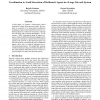Free Online Productivity Tools
i2Speak
i2Symbol
i2OCR
iTex2Img
iWeb2Print
iWeb2Shot
i2Type
iPdf2Split
iPdf2Merge
i2Bopomofo
i2Arabic
i2Style
i2Image
i2PDF
iLatex2Rtf
Sci2ools
IJCAI
2007
2007
Coordination to Avoid Starvation of Bottleneck Agents in a Large Network System
In this paper, we present a multi-agent control method for a large-scale network system. We propose an extension of a token-based coordination technique to improve the tradeoff between two conflicting objectives of the network system: reducing the lead time and increasing throughput. In our system, CABS, information about an agent’s urgency of jobs to fulfill demanded throughput and to maintain its utilization is passed from downstream agents in the network so that upstream agents can provide necessary and sufficient jobs to bottleneck agents whose loss of capacity degrades the total system performance. We empirically evaluate CABS performance using a benchmark problem of the semiconductor fabrication process, which is a good example of a large-scale network system.
Artificial Intelligence | IJCAI 2007 | Large-scale Network System | Multi-agent Control Method | Token-based Coordination Technique |
| Added | 29 Oct 2010 |
| Updated | 29 Oct 2010 |
| Type | Conference |
| Year | 2007 |
| Where | IJCAI |
| Authors | Rajesh Gautam, Kazuo Miyashita |
Comments (0)

